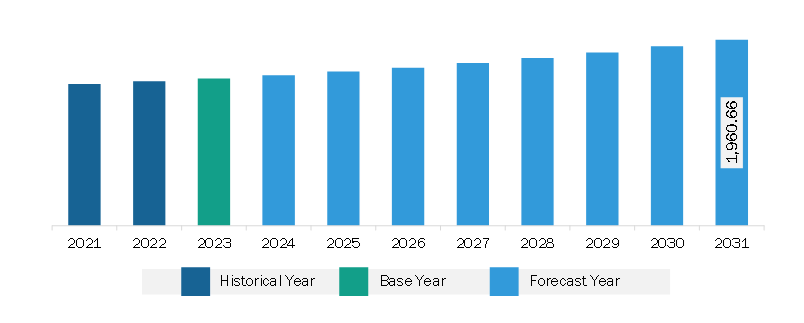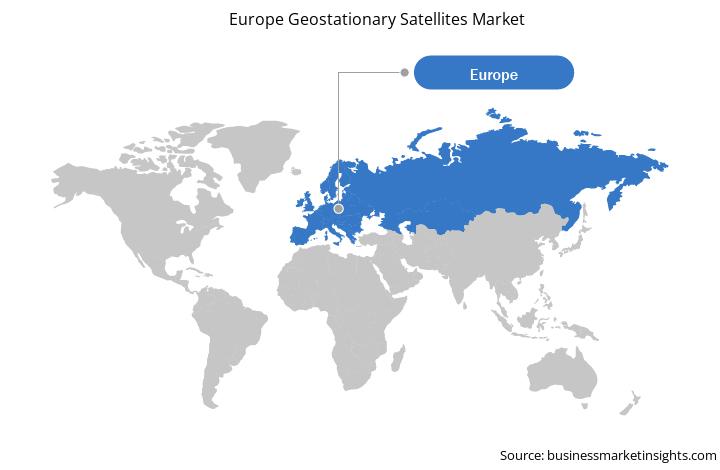The Europe geostationary satellites market was valued at US$ 1,552.76 million in 2023 and is expected to reach US$ 1,960.66 million by 2031; it is estimated to record a CAGR of 3.0% from 2023 to 2031.
The rising demand for electronic warfare has been pushing the deployment of satellite-based communication systems for military applications across different regions. This is further supported by the increasing military investments in the procurement of military SATCOM systems across different regions. Such factors have been pushing the demand for direct-to-cell satellite services among the military forces. For instance, companies such as Astranis, Terran Orbital, Maxar Technologies, and SWISSto12 have been providing small satellites for deployment into the geostationary orbits that can be deployed in a lesser timeline along with a reduction in overall size, weight, and cost of the geostationary orbital satellites. Such factors have been raising interests of military forces for geostationary satellite-based communication network deployments.
In May 2024, the European Defense Organization announced the funds of US$ 7 million to launch an autonomous Bodyguard satellite in the geosynchronous earth orbit. With a strong emphasis on satellite launches for earth observation and other research activities, European countries have emerged as key players in advancing geostationary satellite technologies. Leading aerospace and space companies such as Airbus and Thales Alenia Space, which are renowned for their expertise in developing cutting-edge geostationary satellite systems, are the prime contributors to the space sector in Europe. Several space research and earth observation programs are being introduced to launch new satellites in Europe. In 2022, the European Space Programme was launched to bolster the European space sector with a budget of ~US$ 14 billion, with a particular focus on fields such as satellite navigation, connectivity, earth observation, and space research. The European Space Programme is expected to promote the launch of new satellites, thereby creating significant opportunities for the geostationary satellite market in the region.
Strategic insights for the Europe Geostationary Satellites provides data-driven analysis of the industry landscape, including current trends, key players, and regional nuances. These insights offer actionable recommendations, enabling readers to differentiate themselves from competitors by identifying untapped segments or developing unique value propositions. Leveraging data analytics, these insights help industry players anticipate the market shifts, whether investors, manufacturers, or other stakeholders. A future-oriented perspective is essential, helping stakeholders anticipate market shifts and position themselves for long-term success in this dynamic region. Ultimately, effective strategic insights empower readers to make informed decisions that drive profitability and achieve their business objectives within the market. The geographic scope of the Europe Geostationary Satellites refers to the specific areas in which a business operates and competes. Understanding local distinctions, such as diverse consumer preferences (e.g., demand for specific plug types or battery backup durations), varying economic conditions, and regulatory environments, is crucial for tailoring strategies to specific markets. Businesses can expand their reach by identifying underserved areas or adapting their offerings to meet local demands. A clear market focus allows for more effective resource allocation, targeted marketing campaigns, and better positioning against local competitors, ultimately driving growth in those targeted areas.
Europe Geostationary Satellites Strategic Insights

Europe Geostationary Satellites Report Scope
Report Attribute
Details
Market size in 2023
US$ 1,552.76 Million
Market Size by 2031
US$ 1,960.66 Million
Global CAGR (2023 - 2031)
3.0%
Historical Data
2020-2021
Forecast period
2023-2031
Regions and Countries Covered
Europe
Market leaders and key company profiles
Europe Geostationary Satellites Regional Insights

The Europe geostationary satellites market is categorized into component, application, and country.
Based on component, the Europe geostationary satellites market is segmented into communication system, power system, propulsion system, and others. The communication system segment held the largest market share in 2023.
In terms of application, the Europe geostationary satellites market is categorized into communications, space exploration, navigation, earth observation, and others. The communications segment held the largest market share in 2023.
By country, the Europe geostationary satellites market is segmented into Germany, France, Italy, the UK, Russia, and the Rest of Europe. France dominated the Europe geostationary satellites market share in 2023.
Airbus SE; Ball Corp; Israel Aerospace Industries Ltd; Lockheed Martin Corp; Northrop Grumman Corp; OHB SE; Thales SA; and The Boeing Co are some of the leading companies operating in the Europe geostationary satellites market.
The Europe Geostationary Satellites Market is valued at US$ 1,552.76 Million in 2023, it is projected to reach US$ 1,960.66 Million by 2031.
As per our report Europe Geostationary Satellites Market, the market size is valued at US$ 1,552.76 Million in 2023, projecting it to reach US$ 1,960.66 Million by 2031. This translates to a CAGR of approximately 3.0% during the forecast period.
The Europe Geostationary Satellites Market report typically cover these key segments-
The historic period, base year, and forecast period can vary slightly depending on the specific market research report. However, for the Europe Geostationary Satellites Market report:
The Europe Geostationary Satellites Market is populated by several key players, each contributing to its growth and innovation. Some of the major players include:
The Europe Geostationary Satellites Market report is valuable for diverse stakeholders, including:
Essentially, anyone involved in or considering involvement in the Europe Geostationary Satellites Market value chain can benefit from the information contained in a comprehensive market report.